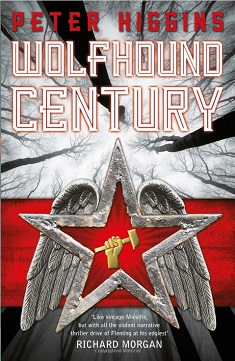
Wolfhound Century
Peter Higgins
303 pages
published in 2013
Despite buying more books than’s probably good for me, I still keep a library membership and thanks to that I still end up finding science fiction or fantasy writers and books I wouldn’t encounter otherwise. Case in point: Peter Higgins Wolfhound Century, which I saw lying on the pile of new fiction books near the entrance and whose cover drew my attention. Reading the back cover blurb and the first few pages was enough to take a punt on it. They confirmed what the cover artwork seemed to suggest, that this was a fantasy novel inspired by Soviet Russia, not a setting you see much in fantasy.
The protagonist, investigator Vissation Lom, is the classic honest cop in a totalitarian system and his honesty has of course made him enemies. Nevertheless he’s one of the best investigators in Vlast, which is why he has been summoned to the capital Mirgorod by the head of the secret police. He is to stop and catch Josef Kantor, a terrorist protected by powerful forces from within the Vlast security apparatus itself. Without ties to any of the political factions in the capital or the security services, Lom is hoped to have a better chance at getting Kantor.
So far Wolfhound Century could’ve just as well been set in historical Russia, rather than in a fantasy version of it, but before long it becomes clear more is going on than just some sort of power play within the ruling elites. Kantor hears the voice of a fallen angel, one of the mysterious beings that occassionally rain down on the earth, which centuries ago broke the moon and made possible the very rise of Vlast as a totalitarian empire. Normally those “angels” are dead before they reach the ground, but not this one. This one is imprisoned within the wild forest beyond Vlast’s borders, captured within the earth and making plans to set himself free, plans which Kantor is an essential part of.
Vlast is not a static fantasy empire, though it does portray itself as unchanging, but remnants of its past, both pre- and post founding can be found even in Mirgorod. Within living memory frex the state turned on its own aristocracy. It’s also a state in crisis, losing a war abroad and suffering dissent and resistance at home. Its elites are divided about the need to end the war, while the seemingly senseless violence of Kantor is driving it to a breaking point.
Meanwhile there’s also the matter of Kantor’s supposed daughter Maroussia, whose mother is a forest witch, somebody with ties to the old forest magic, driven mad by it. Maroussia seems to have inherited this talent, much against her will and through it we get glimpses of the Pollandore, “world within a world” and possible key to a different future than the course the fallen angel is setting for Vlast. And not just a different future, but an alternate present and past are hinted at too, in the photographs Lom’s artist friend Vishnik makes of non-existant buildings and streets in the capital.
There is than, at the heart of Wolfhound Century, the outline of a struggle visible, between the totalitarian, Orwellian vision of the Angel, a glorious, fixed future (and past?) in which the earth becomes a launching pad for an universe wide crusade and that of the Pollandore, multiple, flexible pasts, presents and futures, available in essence if not in reality. Yet.
For the most part this vision however is hidden behind the familiar mechanics of the thriller, as Lom and Maroussia have to escape from Kantor’s attentions and the villains make their moves. This all moves along nicely, but isn’t much different from a dozen similar books. What makes it is Higgins’ obvious love for the setting and his writing, as well as those glimpses of the meta plot. I can forgive a writer a lot when he has such pleasure in the journey as well as the destination.
With regards to the setting, there is the problem that, if like Nina Allan at Strange Horizons, you’re familiar with Russian history and literature, you may find Higgins wears his influences on his sleeve, perhaps a tad too much so. For me, though some things were obvious, this wasn’t a problem.
All in all this is an intriguing novel by a writer I wouldn’t mind reading more off. A good case for visiting my library more.